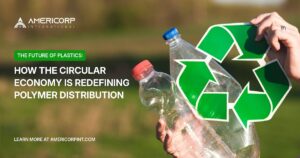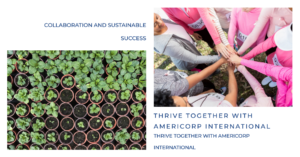Plastic is an essential part of our daily lives. From packaging materials to consumer goods, plastic has become an indispensable material that we use almost every day. However, its widespread use has led to environmental concerns, particularly the problem of plastic waste. As a result, there has been a growing interest in finding sustainable alternatives to plastic. In this article, we will explore the future of plastics, trends, and insights from Americorp.
Table of Contents
Introduction
Plastic has been one of the most versatile and cost-effective materials in the world. It is used in almost every industry, from packaging and consumer goods to automotive and construction. However, the negative impact of plastic on the environment is undeniable. As consumers become more aware of the environmental impact of plastic, companies are looking for sustainable alternatives to plastic. This article will explore the future of plastics, the latest trends, and insights from Americorp, a leading manufacturer of sustainable plastics.
Sustainable Plastics
Sustainable plastics are becoming increasingly popular as consumers and companies become more aware of the impact of plastic on the environment. Sustainable plastics are made from renewable materials, such as corn starch, sugarcane, and vegetable fats and oils. They are biodegradable and compostable, which means they can be broken down naturally without causing harm to the environment.
Americorp’s Sustainable Plastics
Americorp is a leading manufacturer of sustainable plastics. The company’s products are made from renewable materials, such as corn starch and sugarcane. These materials are biodegradable and compostable, which means they can be broken down naturally without causing harm to the environment. Americorp’s sustainable plastics are used in various industries, including packaging, consumer goods, and automotive.
Trends in Sustainable Plastics
The demand for sustainable plastics is increasing as consumers become more aware of the environmental impact of plastic. The following are the latest trends in sustainable plastics:
Biodegradable Plastics
Biodegradable plastics are becoming more popular as they are made from renewable materials and can be broken down naturally without causing harm to the environment.
Compostable Plastics
Compostable plastics are similar to biodegradable plastics, but they break down faster and can be used as fertilizer.
Recyclable Plastics
Recyclable plastics are also becoming more popular as they can be reused or repurposed, reducing waste and minimizing the impact on the environment.
Bio-based Plastics
Bio-based plastics are made from renewable resources such as corn starch, sugarcane, and vegetable fats and oils, reducing the reliance on fossil fuels.
Insights from Americorp
Americorp is at the forefront of the sustainable plastics industry. The following are insights from the company:
Collaborative Innovation
Collaboration with other companies is key to the development of sustainable plastics. Americorp collaborates with other companies to develop sustainable plastics that meet industry standards.
Investment in Research and Development
Investment in research and development is essential to the development of sustainable plastics. Americorp invests in research and development to improve the quality and performance of its sustainable plastics.
Sustainable Sourcing
Sustainable sourcing is essential to the development of sustainable plastics. Americorp sources its materials from sustainable sources, ensuring that its products have a minimal impact on the environment.
Conclusion
The future of plastics is sustainable. The demand for sustainable plastics is increasing as consumers become more aware of the environmental impact of plastic. Americorp is at the forefront of the sustainable plastics industry, developing innovative products that meet industry standards. Collaborative innovation, investment in research and development, and sustainable sourcing are essential to the development of sustainable plastics.
FAQs
What are sustainable plastics?
Sustainable plastics are made from renewable materials, such as corn starch, sugarcane, and vegetable fats and oils. They are biodegradable and compostable, which means they can be broken down naturally without causing harm to the environment.
Why are sustainable plastics important?
Sustainable plastics are important because traditional plastics have a significant impact on the environment. They are not biodegradable and can take hundreds of years to decompose, causing pollution and harm to wildlife. Sustainable plastics offer a more environmentally friendly alternative.
What are the latest trends in sustainable plastics?
The latest trends in sustainable plastics include biodegradable, compostable, recyclable, and bio-based plastics. Biodegradable and compostable plastics are made from renewable materials and can be broken down naturally without causing harm to the environment. Recyclable plastics can be reused or repurposed, reducing waste. Bio-based plastics are made from renewable resources, reducing the reliance on fossil fuels.
How is Americorp contributing to the development of sustainable plastics?
Americorp is at the forefront of the sustainable plastics industry, developing innovative products that meet industry standards. The company collaborates with other companies to develop sustainable plastics, invests in research and development, and sources its materials from sustainable sources.
What can individuals do to reduce their use of traditional plastics?
Individuals can reduce their use of traditional plastics by using reusable bags, water bottles, and containers. They can also recycle plastics properly and choose products made from sustainable materials. By making small changes in their daily lives, individuals can make a significant impact on the environment.
In conclusion, the future of plastics is sustainable. As consumers become more aware of the impact of plastic on the environment, the demand for sustainable plastics will continue to grow. Americorp is a leading manufacturer of sustainable plastics, developing innovative products that meet industry standards. Collaborative innovation, investment in research and development, and sustainable sourcing are essential to the development of sustainable plastics. As individuals, we can also contribute to the reduction of traditional plastics by making small changes in our daily lives. By working together, we can create a more sustainable future.








